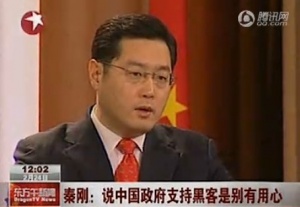“Ulterior motives”的版本间的差异
来自China Digital Space
小 (文本替换 - 替换“Category”为“分类”) |
|||
| (未显示6个用户的34个中间版本) | |||
| 第1行: | 第1行: | ||
| − | 别有用心 | + | <h3>''biéyǒuyòngxīn'' 别有用心 </h3> |
| + | |||
| + | [[File:ulteriormotives.jpg|300px|thumb|right|''Former Foreign Ministry Spokesman [[Bird Anus|Qin Gang]]: "Those who claim that the Chinese government supports hackers have ulterior motives." (Tencent)'']] | ||
| − | + | A phrase often used by the official media to blame foreign forces and domestic dissidents for social unrest and criticism of the Chinese government. | |
| − | + | Netizens sometimes twist this phrase to mock the government. | |
| − | + | '''Example:''' | |
| − | + | <blockquote>''Wengtao2015'' (@翁涛2015): If you yell on the street, "Diaoyu Islands belong to China!" you are a patriot. If you instead yell, "Outer Mongolia and Vladivostok belong to China!" you may be arrested as a mad person or someone who has '''ulterior motives'''! Why is that? (February 14, 2015)</blockquote> | |
| − | [[ | + | <blockquote> 如果你站在街上喊:"钓鱼岛是中国的!" 你就是爱国者;你若喊:"外蒙、海参崴是中国的!",你就是有可能被当作疯子或者'''别有用心'''抓起来!这是为什么? [[https://freeweibo.com/weibo/%40%E7%BF%81%E6%B6%9B2015 '''Chinese''']]</blockquote> |
| + | |||
| + | In August of 2016, "[[foreign (hostile) forces | foreign hostile forces]]" with "ulterior motives" made [http://chinadigitaltimes.net/2016/08/fourth-black-friday-detainee-sentenced-show-trial/ multiple appearances in the apparently scripted confessions of the first round of trials] for rights lawyers and activists detained in the [http://chinadigitaltimes.net/china/black-friday-2015/ 2015 "Black Friday" crackdown]. The language being used in the courtroom confessions and [http://chinadigitaltimes.net/2016/08/rights-activists-trial-china-cites-western-plot/ echoed by state media coverage] was suspiciously similar to that being used in a [http://chinadigitaltimes.net/2016/08/hk-activist-branded-us-backed-separatist-govt-video/ parallel propaganda campaign warning against foreign attempts to foment a "color revolution"] in China. | ||
| + | |||
| + | See also [[foreign (hostile) forces]]. | ||
| + | [[分类:Lexicon]][[分类:Censorship and Propaganda]] | ||
2023年8月7日 (一) 05:02的最新版本
biéyǒuyòngxīn 别有用心

A phrase often used by the official media to blame foreign forces and domestic dissidents for social unrest and criticism of the Chinese government.
Netizens sometimes twist this phrase to mock the government.
Example:
Wengtao2015 (@翁涛2015): If you yell on the street, "Diaoyu Islands belong to China!" you are a patriot. If you instead yell, "Outer Mongolia and Vladivostok belong to China!" you may be arrested as a mad person or someone who has ulterior motives! Why is that? (February 14, 2015)
如果你站在街上喊:"钓鱼岛是中国的!" 你就是爱国者;你若喊:"外蒙、海参崴是中国的!",你就是有可能被当作疯子或者别有用心抓起来!这是为什么? [Chinese]
In August of 2016, " foreign hostile forces" with "ulterior motives" made multiple appearances in the apparently scripted confessions of the first round of trials for rights lawyers and activists detained in the 2015 "Black Friday" crackdown. The language being used in the courtroom confessions and echoed by state media coverage was suspiciously similar to that being used in a parallel propaganda campaign warning against foreign attempts to foment a "color revolution" in China.
See also foreign (hostile) forces.




